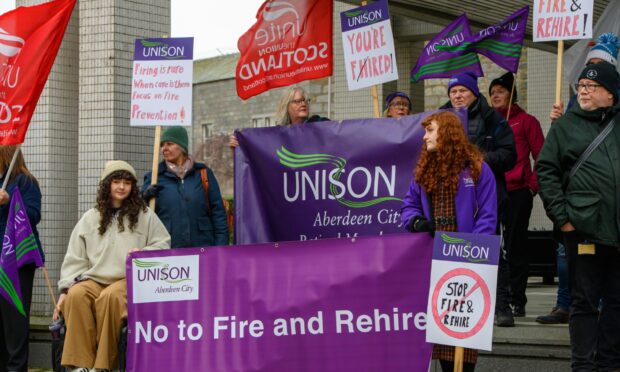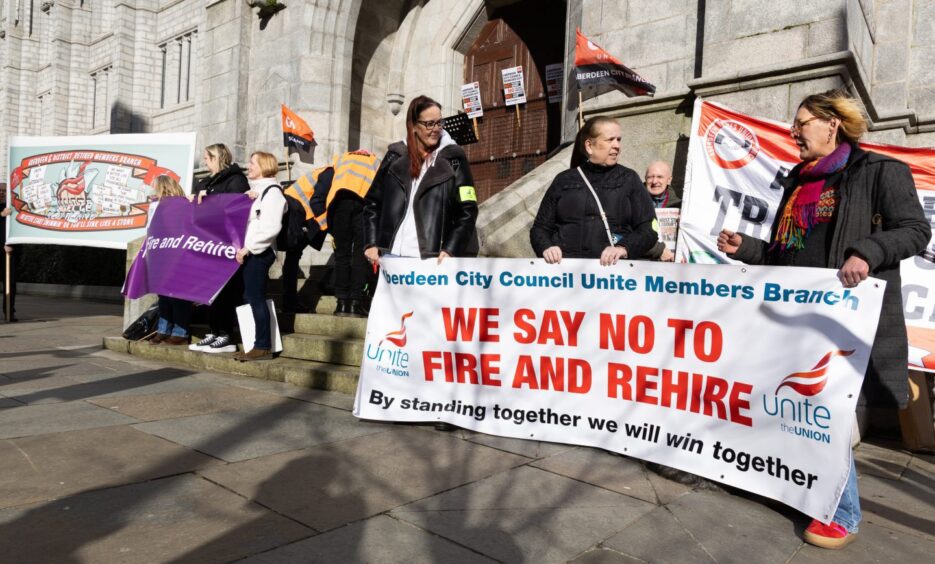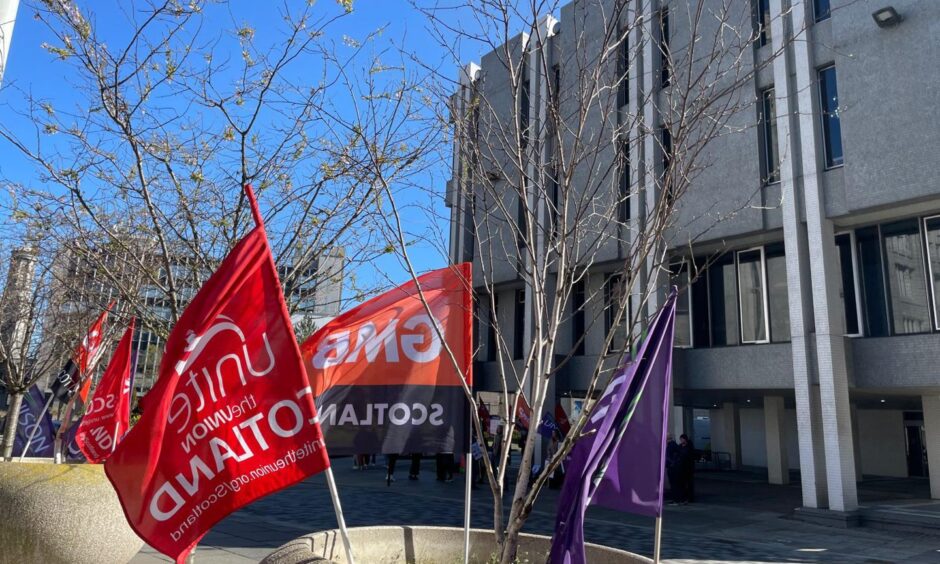The threat of rubbish piling up on Aberdeen streets and support for the city’s most needy grinding to a halt appears to be growing more real with each passing day.
Scores of frustrated council workers have vowed to take strike action amid an increasingly bitter battle over pay and hours.
As part of a major restructure, bosses want to slash workers’ hours from 37 to 35 per week – while freezing pay.
And there are escalating tensions as the council refuses to rule out a controversial “fire and rehire” policy – which would see workers removed from their position and re-employed under the unfavourable terms.
The row has dominated headlines for months.
And as the saga continues, we’ve broken down exactly why staff are furious, why the council are refusing to rule out ‘fire and rehire’, and the impact this could have on Aberdeen.
What is ‘fire and rehire’?
Fire and rehire, more formally known as “dismissal and re-engagement”, is a controversial tactic used by employers to dismiss workers and then bring them back on new contracts.
Unions argue that these new terms often tend to work out worse for the employee involved.
Bosses usually resort to this move when they wish to change the conditions of staff contracts, but they can’t come to an agreement with personnel.
This often puts workers between a rock and a hard place – either lose their jobs or accept terms that will make them worse off.
The practice is set to be outlawed nationwide, as the Labour UK Government presses ahead with its new Employment Rights Bill.
While SNP politicians have denounced it, their counterparts running Aberdeen have repeatedly refused to remove it from the table.
Why are Aberdeen City Council workers angry?
The row kicked off at the start of the year.
Ahead of the local authority’s budget being set, staff were asked to sign up to standstill wages which could “last for years” according to union officials.
This would be done through reducing the working week from 37 hours to 35 hours.
And while the reduction in hours was appreciated by unions, they take issue with the proposed pay freeze that comes along with it.
This could potentially last for years until pay rises overtake workers’ current 37-hour-a-week stipend.
Union leaders say this will punish staff, while they also worry about extra work being piled on employees to make up for the lost hours.
They fear any such move will hit the lowest paid hardest, some of whom are already “resorting to foodbanks”.
The plans, which affect around 3,300 employees, cover all full-time members of staff who work the full year, so it won’t affect teachers and other term-time staff.
What affect would these changes have on council employees?
A recent survey from Unison laid bare what the pay freeze and hours reduction could mean for council employees.
The union found that over three quarters of staff “already work beyond their contracted hours”, with half doing additional work “in the evenings or at weekends”.
Some workers said the changes “feel like a punishment” and that it means “unpaid work and increased stress”.
The shocking survey also reveals that only 2% of staff have been told how to reduce their work in future, with almost one in five being absent with work related stress.
And over 43% of respondents said they expect to lose over £1,500 per year if they were to agree to the council’s proposed terms.
Why are the council refusing to rule out fire and rehire?
The local authority agreed last year to slash £5 million from its wage bill in a move to cut costs wherever they can.
Shuffling at the top – having one fewer director job and merging two chief officer posts into one – was expected to save hundreds of thousands of pounds.
The plans affect those right at the bottom of the ladder all the way up to the chief executive Angela Scott, as revealed in last week’s emergency summit.
A council spokeswoman previously explained they are required to make “significant savings” in the years ahead.
“Moving from a standard 37-hour working week to a 35-hour working week would help deliver this, whilst also giving staff time back,” she said.
They also added that the change in hours came as a result from “feedback from trade unions, including pay preservation aimed at mitigating any associated pay reduction”.
But despite this, talks have broken down between the local authority and union chiefs, with drastic measures becoming more possible…
What will happen next?
Last week, hundreds of council workers overwhelmingly backed strike action.
Almost 90% of GMB Scotland members at the local authority support industrial action unless the council lifts the threat of “fire and rehire”.
Union leaders have warned that strikes would unleash “chaos” on Aberdeen, with bins left to overflow and vital support services for the most vulnerable grinding to a halt.
And more could follow suit, as two weeks ago, Unite notified the council of a members ballot on industrial action.
Crunch talks involving councillors took place last Wednesday to try and resolve the dispute.
But after the meeting, which was held behind a cloak of secrecy, “fire and rehire” was still on the table.
Read more of The Press and Journal’s coverage of the saga:
- Council confirms chief executive included in ‘fire and rehire’ pay row as Aberdeen workers banned from crunch meeting in bid to ‘hide the mess’
- ‘We WILL strike’: Thousands of Aberdeen council staff ‘to be fired and rehired on worse pay and conditions’ as dispute intensifies
- Aberdeen council workers back strikes over ‘fire and rehire’ threat







Conversation